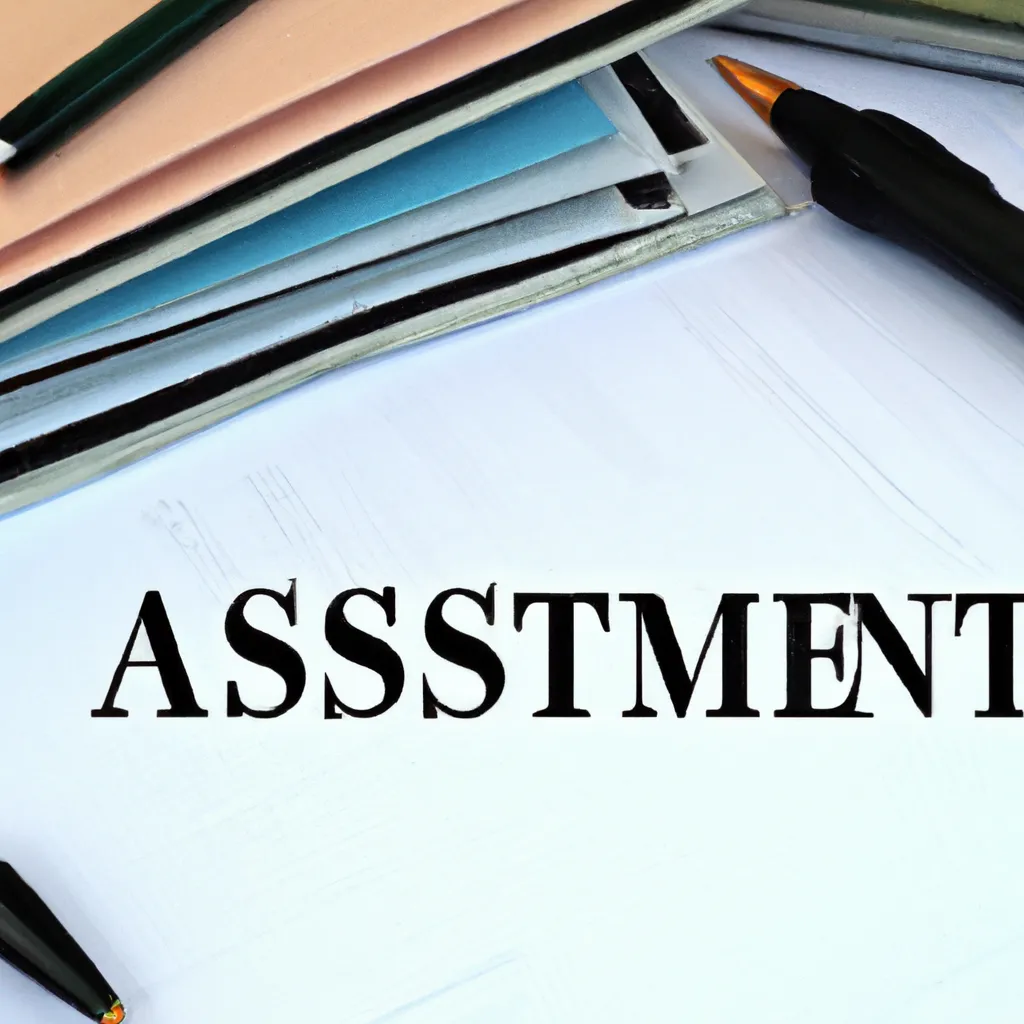Are you searching for reliable asset management services in Warrington. Look no further. Our expert team offers top-notch asset management services along with comprehensive accounting solutions to help you improve your financial portfolio and achieve your business goals. In just a few short paragraphs, we will give you an overview of our expert asset management and accounting services.
Our team of professionals has years of experience and a proven track record of successfully managing assets and helping clients achieve financial success. From evaluating your current financial standing to designing customized investment plans, we are dedicated to providing you with top-quality services tailored to your specific needs. So why wait. Learn more about our expert asset management services and discover how we can help you grow your wealth and achieve financial stability.
With our trusted and experienced team, you can rest assured that your assets are in capable hands. Don't just take our word for it, numerous satisfied clients have praised our services and efficiency. Get in touch with us today and let us help you grow and manage your assets for a brighter financial future.

Understanding amortization: what it means and how it works
When it comes to asset management, one important concept to understand is amortization. This financial term refers to the process of gradually paying off a debt or liability over time through regular payments.
In other words, it is a method of spreading out the cost of an expensive asset such as a property or equipment over its useful life. Amortization allows businesses to manage their financial resources more effectively and minimize the impact of large expenses on their cash flow.
Breaking down the concept of amortization
To better understand how amortization works, let's break it down into its individual components. The first part of the word, “a-” means “to,” while “-mortization” comes from the latin word for death. Therefore, amortization can be thought of as the process of gradually paying off a debt “to death,” or over its lifetime.
In the context of asset management, amortization is the systematic allocation of the initial cost of an asset over its expected useful life. This allows businesses to match the cost of the asset with the revenue it generates, resulting in a more accurate representation of their financial position.
Amortization is typically applied to long-term assets, such as buildings, equipment, and intangible assets like patents and trademarks. These types of assets have a limited useful life and are expected to decline in value over time due to factors such as wear and tear, obsolescence, or market conditions.
Types of amortization methods and which one is best for your business
There are several methods of amortization, each of which is suitable for different types of assets and business needs. The most common methods include straight-line amortization, declining balance amortization, and sum-of-years'-digits amortization.
straight-line amortization Is the simplest and most straightforward method. It allocates equal amounts of the asset's cost over its expected useful life. For example, if a piece of equipment costs $10,000 and has a useful life of 5 years, the yearly amortization expense will be $2,000.
declining balance amortization, also known as accelerated amortization, allocates a higher amount of the asset's cost in the earlier years and less in the later years. This method is commonly used for assets that are expected to lose value more rapidly in the early stages of their useful life.
sum-of-years'-digits amortization Allocates a higher amount of the asset's cost in the early years and reduces the amount in the later years, similar to declining balance amortization. However, it takes into account the asset's expected useful life and adjusts the allocation accordingly. This method is typically used for assets that have a predictable pattern of use or decline in value.
The best method of amortization for your business will depend on the nature of the asset and your organization's financial goals. Your accountant can help you determine the most appropriate method to use.
The importance of accurate amortization for your balance sheet and financial reporting
Accurate amortization is essential for maintaining an accurate balance sheet and financial reporting. The amortization expense is recorded on a business's income statement, reducing its taxable income and lowering its tax liability. At the same time, the asset's value decreases on the balance sheet, reflecting its declining value over time.
Not accurately accounting for amortization can result in miscalculations on the balance sheet and income statement, resulting in financial misrepresentation. It can also lead to penalties and fines if the tax authorities uncover any discrepancies during an audit.
Additionally, accurate amortization can also provide valuable insights into the overall financial health of a business. Tracking the amortization expense over time can reveal trends in asset performance and can help in making informed financial decisions for the future.
Amortization is a crucial concept in asset management that allows businesses to efficiently manage their financial resources and accurately reflect their financial position. By understanding the different methods of amortization and its importance in financial reporting, businesses can make informed decisions to optimize their financial performance.

The role of bonds in amortization and financial management
The basics of asset management
Asset management is a crucial aspect of any financial strategy, and understanding the role of bonds in managing assets is key to financial success. Bonds are a type of fixed-income investment in which investors lend money to an entity, such as a corporation or government, in exchange for regular interest payments and the return of their principal investment at a predetermined maturity date. In essence, they are a loan from the investor to the borrower.
Bonds play an essential role in asset management because they are a relatively safe and reliable investment option that can provide a steady flow of income. They also help balance out the risk of other investments, such as stocks, in a portfolio. But how do bonds tie into the concept of amortization, and what benefits do they provide in an amortization strategy?
The relationship between bonds and amortization
Amortization is the process of paying off a debt by making regular payments over time, typically with a fixed interest rate. In the case of bonds, the regular interest payments made by the borrower to the investor can be seen as a form of amortization. The borrower is gradually paying off the loan through these interest payments until the maturity date, when the entire principal amount is returned to the investor.
Therefore, bonds play a crucial role in amortization by providing a structured repayment schedule and steady income stream for the investor. This can be especially useful for individuals or organizations looking to pay off debts or manage their assets over a longer period of time.
The benefits of using bonds in amortization
There are several benefits to including bonds in your amortization strategy:
1. Stability and consistencyAs mentioned earlier, bonds offer a steady and reliable source of income through regular interest payments. This can provide stability and consistency to your amortization strategy, making it easier to plan and manage your finances. Unlike other investments that are subject to market fluctuations, bonds have a fixed interest rate, making it easier to forecast income and plan for expenses.
2. Diversification of assetsIncluding bonds in your overall asset management strategy can help diversify your investments and reduce overall risk. This is because bonds typically have a lower risk profile compared to other assets such as stocks. By diversifying your investments, you can mitigate potential losses and achieve a more balanced portfolio.
3. Potential for appreciationThough bonds are often seen as a stable and low-risk investment, they can also appreciate in value over time. This is particularly true for bonds issued by entities with a strong credit rating. As the borrower's creditworthiness improves, the value of the bond also increases, providing potential appreciation of assets for the investor.
Effective management of bonds for maximum amortization gains
In order to use bonds effectively in your amortization strategy, it is essential to have a sound management plan in place. Here are some tips for maximizing gains from your bond investments:
1. Monitor market conditions and interest ratesMarket conditions and interest rates can have a significant impact on the value of bonds. It is important to regularly monitor these factors to determine which bonds are best suited for your amortization strategy. For example, if interest rates are expected to rise, it may be beneficial to invest in short-term bonds with a lower yield. On the other hand, if interest rates are low, longer-term bonds may offer higher yields.
2. Diversify your bond portfolioAs with any investment, it is important to diversify your portfolio to reduce risk. This can involve investing in a variety of bonds with different maturities, yields, and credit ratings. By diversifying your bond portfolio, you can spread out risk and maximize your chances of gaining a return on your investment.
3. Consider professional asset management servicesManaging bonds and other assets can be a complex task, especially for individuals or organizations with large portfolios. In such cases, it may be beneficial to seek the help of professional asset management services such as those offered by warrington asset management. These services can help you develop a tailored amortization strategy and provide ongoing management and monitoring of your bond investments.
The bond-amortization connection: a powerful tool in financial management
Bonds and amortization go hand in hand when it comes to managing assets and achieving financial stability. By understanding the relationship between these two concepts and effectively managing your bond investments, you can maximize the benefits they offer in terms of stability, diversification, and potential appreciation of assets. Whether you are an individual looking to pay off debts or an organization with a large portfolio, incorporating bonds into your financial strategy can provide significant long-term gains. So if you want to make the most out of your amortization, don't forget to consider the role of bonds in your asset management plan.

Amortization and asset management: maximizing appreciation
Asset management is a crucial aspect of any business, regardless of its size or industry. It involves strategically managing and overseeing all the company's assets, including financial resources, physical assets, and intangible assets. One of the key goals of asset management is to increase the value of these assets over time, also known as appreciation. In this article, we will dive deeper into the concept of asset appreciation and how amortization can play a vital role in enhancing it.
Understanding asset appreciation and how amortization can help enhance it
Asset appreciation is an increase in the value or worth of an asset over time. This can be due to various factors such as market demand, inflation, improvements made to the asset, and efficient management practices. Appreciation is important for businesses as it can lead to higher profits, better financial stability, and improved overall value. It also helps a company maintain a strong balance sheet, which is essential for long-term success.
Amortization, on the other hand, is a financial concept that involves spreading out the cost of an asset over its useful life. In simpler terms, it is the process of paying off debts or loans in regular installments over a specific period. When applied to assets, amortization can help enhance appreciation in two main ways: by reducing the overall cost and by improving asset management strategies.
Let's consider an example to understand this better. Company a purchases a new machinery worth $100,000, with a useful life of 5 years. Instead of paying the entire amount upfront, they choose to amortize the cost over the 5-year period. This means they pay $20,000 annually, resulting in a $20,000 expense on their income statement each year. By spreading out the cost, company a can allocate their financial resources more efficiently, allowing them to invest in other areas of the business. This can lead to higher profits and better overall performance, ultimately contributing to an increase in asset appreciation.
Leveraging amortization for effective asset management strategies
Amortization can also play a key role in enhancing asset management strategies. As mentioned earlier, amortization helps a business spread out the cost of an asset over its useful life. This can help in creating a more accurate and realistic budget, as it takes into account the ongoing expenses associated with the asset. It also allows for better financial planning and risk management, as businesses know exactly how much they need to allocate for amortization expenses each year.
Additionally, amortization can also help businesses make more informed decisions about their assets. By knowing the true cost of an asset over its useful life, businesses can determine if it is worth investing in, if the returns will be worth the cost, and if it aligns with their long-term goals. This can prevent businesses from making impulsive or impractical investments that could harm their asset management strategies and overall financial health.
Real world examples of companies using amortization to drive asset appreciation
Many successful companies have implemented amortization as part of their asset management strategies, leading to enhanced asset appreciation. One such example is warrington, a multinational technology company. Warrington recently purchased new equipment for their manufacturing facilities but chose to amortize the cost over the useful life of the asset. This enabled them to allocate their financial resources more efficiently, leading to higher profits and improved financial stability. As a result, the equipment's value has appreciated significantly, contributing to warrington's overall success and reputation as a top-performing company in the tech industry.
Another real-world example is company b, a retail company that used amortization to improve their asset management practices. Company b regularly invests in new storefronts and equipment for their stores. By amortizing these assets, they were able to make more informed decisions about where to invest and how much to allocate for amortization expenses. This has helped company b maintain a strong balance sheet and drive asset appreciation, setting them apart from their competitors in the retail market.
Asset appreciation is essential for any business to thrive and succeed in today's competitive market. Amortization can be a powerful tool in enhancing asset appreciation, whether by reducing costs or improving asset management strategies. As seen in real-world examples, companies that have effectively utilized amortization have seen a significant increase in asset appreciation, leading to long-term success and growth. Therefore, businesses must leverage amortization as part of their asset management strategies to maximize appreciation and drive overall success.
Expert accounting services in portsmouth for your amortization needs
Managing your assets and business finances can be a daunting task, especially when it comes to amortization. Amortization is the process of allocating the cost of an intangible asset over a specific period, and it requires accurate calculations to ensure proper financial management. As a business owner in portsmouth, you understand the importance of effectively managing your assets while also upholding financial stability. That's why it is crucial to have expert accounting services in place to handle all your amortization needs.
Finding the right professionals for accurate and effective amortization
When it comes to amortization, it is crucial to have precision and accuracy in your calculations. Any errors or mistakes could lead to significant financial consequences for your business. That's why it is essential to partner with experienced accountants for all your amortization needs.
However, finding the right professionals in portsmouth can be a challenge. With so many accounting firms, it can be overwhelming to determine which one is best suited for your business. But worry not, as we are here to guide you in choosing the right experts for your amortization needs.
First and foremost, look for an accounting service that has a team of qualified and experienced professionals. These individuals should have a strong understanding of accounting principles and an in-depth knowledge of amortization. They should also have extensive experience in handling similar tasks for other businesses in the warrington area.
Next, it is essential to find an accounting firm that utilizes the latest technology and software for their services. This ensures that your calculations are accurate and efficiently done. With the right tools at their disposal, accounting professionals can also identify any potential areas for improvement in your business's financial management.
Finally, don't forget to check for the firm's reviews and testimonials from their previous clients. This will give you a good idea of their reliability and the quality of services they provide. Look for firms with a proven track record of delivering accurate and effective amortization solutions.
The benefits of outsourcing your amortization needs to experienced accountants
Outsourcing your amortization needs to experienced accountants can bring numerous benefits to your business. First and foremost, it allows you to focus on other essential aspects of your business, such as growth and expansion. By leaving the complex and time-consuming task of amortization to the professionals, you can save valuable time and energy to invest in other areas of your business.
In addition, outsourcing your amortization needs can also save you money in the long run. By partnering with experts, you can avoid costly mistakes and errors that could lead to financial consequences for your business. Moreover, you will have access to accurate and up-to-date reports, giving you a better understanding of your business's financial health.
Another advantage of outsourcing is the peace of mind that comes with entrusting your amortization needs to experts. You can rest assured that your calculations are being handled by professionals with the knowledge and experience to deliver accurate and efficient results. This allows you to have a better grasp of your assets and make informed decisions for your business's future.
How quality accounting services can help improve overall financial management
Besides handling your amortization needs, partnering with quality accounting services in portsmouth can bring overall improvements to your financial management. These professionals can provide valuable insights and advice on how to optimize your business's financial health.
One significant aspect of financial management is asset management. With professional accounting services, you can have a better understanding of your assets' value and how to manage them effectively. This includes strategies for asset appreciation, which can significantly impact your business's bottom line.
In addition, accounting services can also help you with your balance sheet management. This is crucial for proper financial management and decision making, as it provides a snapshot of your business's financial position at any given time. With accurate and up-to-date balance sheet information, you can make more informed decisions for your business's growth and sustainability.
Overall, quality accounting services can provide crucial support for your business's financial management, including asset management, appreciation, and balance sheet management. By partnering with the right professionals, you can have peace of mind knowing that your business's financial needs are in good hands.
Having expert accounting services in portsmouth for your amortization needs can greatly benefit your business. By entrusting the task to qualified and experienced professionals, you can save time and money while also improving your overall financial management. So don't hesitate to outsource your amortization needs to reputable and reliable accounting services today!

